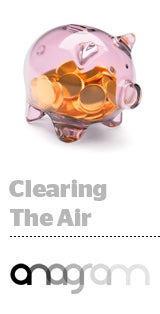 The Association of National Advertisers and the 4As might be mending fences, but transparency – or the lack thereof – is still an issue.
The Association of National Advertisers and the 4As might be mending fences, but transparency – or the lack thereof – is still an issue.
It’s why programmatic agency Anagram decided to start setting its clients up with their own direct platform contracts, rather than stepping in as the middleman.
Anagram founder Adam Cahill calls it “radical transparency.”
“The reason there are transparency issues in the agency world is because agencies are getting squeezed on margin and they can’t convey what their actual value is,” said Cahill, who left his post as chief digital officer at IPG’s Hill Holliday in April to found Anagram. “[But] instead of having that conversation with their clients about the value they’re providing, agencies are finding other ways to get what they think their value is out of the ecosystem.”
In some cases, it’s a matter of undisclosed margins, in others it’s double dipping or rebates. Sometimes, the tech platforms take advantage of their brand-direct relationships to do a little skimming.
But it all boils down to opacity.
“We’re trying to grow our ad presence in different channels, so it’s really critical for us to understand what’s happening in each one,” said Dan Smith, COO of fitness app RunKeeper. “And if there’s no transparency, we’re basically missing big chunks of information that would otherwise help us make better decisions.”
RunKeeper has been working with Anagram on reach extension and building out an audience network to help advertisers connect with its users across other apps and sites.
When RunKeeper first started working with Anagram, the agency, as it does for its other clients, facilitated a direct contractual relationship between RunKeeper and the buying platform – Anagram’s preferred partner is MediaMath – including an explicitly stated fee structure.
From there, Anagram started running campaigns on behalf of RunKeeper, and RunKeeper, if it were so inclined, could log into the system whenever it wanted to see how things were going.
It’s still a managed service, but with an added layer of visibility into the process. And at the end of the month, clients get two bills: one from the platform and one from Anagram for its services. Anagram doesn’t see MediaMath’s bill, so there’s no chance to mark it up or modify it in any way.
“Honestly, we probably wouldn’t have engaged in the relationship without this arrangement,” Smith said. “If you’re offering a product or service and if the service has some value, there should be no hesitation to convey the cost and price of that value.”
Just knowing that he could log in at any time is comfort enough for Smith. He almost never actually does. “The fact that we have that ability is the seal of trust and verification we need,” said Smith.
But for Anagram client Sean McGrail, co-founder of Paint Nite, which helps run art class events at 2,500 local bars across the US, Canada, the UK, Argentina and South Africa, being able to “roll up my sleeves and dig in” is a big part of the appeal.
“I’m a co-founder. I like getting involved. When we first started the company, I used to carry boxes of canvases and I’m the guy who first starting running Facebook ads for us,” McGrail said. “That’s partly why we’ve gone through other agencies so quickly, because we dig into the numbers. We’re not Coca-Cola, but we’re a data-driven digital company.”
Paint Nite had a few disenchanting experiences with three other programmatic providers before hooking up with Anagram.
“Their reports would say that we were buying impressions for pennies on the dollar, but when we dug deep we found that sometimes up to 70% of our ads were never even visible by the consumer,” McGrail said. “They’d say, ‘We just showed your ads to 100 million people – isn’t that amazing?’ But then there would be no bump in search traffic and no increase in ticket sales. It was all rather disappointing.”
After working with Anagram for a month, Paint Nite lowered its cost per acquisition by 250%. But that’s not because Anagram’s sauce is more special than anyone else’s, Cahill said. Fewer hidden fees just translate into more working capital.
“It’s not that we’re so much better than all the other platforms,” Cahill said. “It’s that we’re letting clients know exactly how their money is being spent and how much of their media budgets are going toward working spend, how much is going toward service and how much is being taken up by technology fees.”
Unnecessary obfuscation is holding the industry back, Cahill said.
“We think the lack of transparency is inhibiting clients from taking advantage of all that programmatic has to offer, and we want to remove that barrier,” he said. “There is the fee aspect of transparency, but there is also frustration in dealing with people they can’t get a straight answer out of.”
RunKeeper’s Smith has experienced that feeling firsthand.
“Imagine trying to develop a strategy without information,” Smith said. “The less transparency you have, the more difficult it becomes to ramp a successful strategy and execute on it.”











